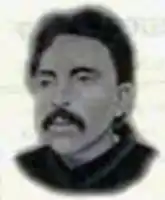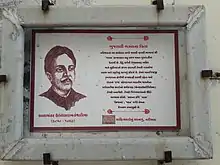Balashankar Kantharia
Balashankar Ullasram Kantharia (May 17, 1858 – April 1, 1898),[1] was a Gujarati poet.
Balashankar Kantharia | |
|---|---|
 | |
| Born | Balashankar Ullasram Kantharia 17 May 1858 Sathodar village, Nadiad, Gujarat |
| Died | 1 April 1898 (aged 39) Vadodara, Gujarat |
| Pen name | Kalant Kavi, Bal,Nijanand,Mast |
| Occupation | poet, translator |
| Language | Gujarati |
| Nationality | Indian |
| Notable works | Hariprem Panchdashi |
Biography
Balashankar Kantharia was born on May 17, 1858 into a Sathodara Nagar Brahmin family in Nadiad (now in Gujarat, India).[2][3] He was born to Ullasram Arjunlal Kantharia, a government magistrate, and Revaba, and had one brother, Umedram, and one sister, Rukshmani. Balashankar had studied till the first year of his college. He was a polyglot and knew Gujarati, Persian, Arabic, Sanskrit, Braj and Hindi languages as well as music and archaeology.[2] His wife's name was Manilakshmi.[4]
He briefly worked in government service. He managed Bharati Bhusan, Itihas Mala, Krishna Mahoday magazines. He served as an editor of Buddhiprakash magazine briefly.[2] He is considered as the founder of the modern Gujarati poetry and Ghazal. Manilal Dwivedi was his close friend. He considered himself as a follower of Dalpatram and was expert in poetry in Shikharini metre.[2] It is believed that Kalapi had learned Ghazal poetry from him and Manilal Dwivedi.[5]
He died due to the plague, on April 1, 1898 at Baroda (now Vadodara, Gujarat).[2]
Works

Kalant Kavi and Bal were his pen names. He is credited for bringing Persian style poetry such as Ghazal in Gujarati literature.[3] Kalant Kavi and Hariprem Panchdashi are his collections of poetry. He had translated Karpūramañjarī by Rajasekhara, Mṛcchakatika and Sufi Ghazals of Hafez in Gujarati.[2]
"Gujare Je Shire Tare" is his popular ghazal poetry composed in Bah’r Hazaj Saalim metre.[6]
References
- Sisir Kumar Das (2000). History of Indian Literature. 1. p. 245.
- "બાલાશંકર કંથારીયા" (in Gujarati). 3 July 2006. Retrieved 23 August 2016.
- Jeṭhālāla Nārāyaṇa Trivedī (1987). Love Poems & Lyrics from Gujarati. p. 145.
- Suhrud, Tridip (1999). "Love, Desire and Moksha: Manibhai Nabhubhai and the Loss of Svadharma" (PDF). Narrations of a Nation: Explorations Through Intellectual Biographies (Ph.D). Ahmedabad: School of Social Sciences, Gujarat University. p. 106. hdl:10603/46631.
- K. M. George (1992). Modern Indian Literature, an Anthology: Surveys and poems. p. 124.
- Smt. Hiralaxmi Navanitbhai Shah Dhanya Gurjari Kendra (2007). Gujarat. 2. Gujarat Vishvakosh Trust.
Further reading
- Mehta, Narmadashankar. કવિબાલ: તેમનું જીવન અને સાહિત્યસેવા [Poet Bal: His Life and Literary Works]. Gujarat Vernacular Society Annual Lecture Series No. 8 (in Gujarati).
External links
- Balashankar Kantharia on GujLit
- Kalant Kavi at the Internet Archive